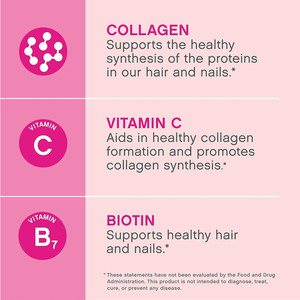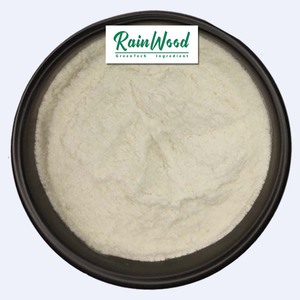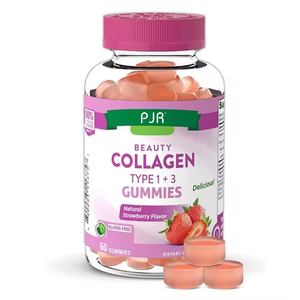Types of Collagen Type 1
Various collagen types are available on the market, each serving different bodily roles. For instance, collagen type 1 is the most abundant in the human body, consisting predominantly of skin, bones, tendons, and other connective tissues. Other collagen types can be found in cartilage and reticular fibers.
Common sources for collagen types include:
- Bovine collagen: Usually sourced from the skin, bones, and muscles of cows, this type often contains collagen types 1 and 3. It is usually applied in supplements and skin care products. Many people use it for health benefits such as improving skin health, boosting joint strength, and enhancing muscle mass.
- Fish collagen: Collagen type 1 and 2 can be sourced from fish, typically from their skin and scales. It is mainly used in supplementation, beauty products, and cosmeceuticals. It contains smaller molecules that are easily absorbed by the body and are thus used for skin health.
- Pork collagen: Usually extracted from the skin and bones of pigs. This variant normally has collagen type 1 and is prominent in gelatin products, supplements, and food items. It is primarily used to enhance skin texture and support joint activity.
- Chicken collagen: Extracted primarily from tendons, cartilage, and skin in chickens, this variant is abundant in type 2 collagen. It is often used in supplements for joint health and therapy.
- Eggshell membrane collagen: This membrane is found between the eggshell and the egg itself, and is a rich source of types 1 and 2 collagen. It is often applied in supplements and joint health products, as well as beauty products. It helps in supporting skin texture while also boosting joint flexibility.
- Split collagen: This is derived from the connective tissues of animals and is rich in type 1 collagen. It is found in specialty foods and supplements. It helps boost skin and bone health.
How to Choose Collagen Type 1
When considering collagen supplements, there are various factors to think about. Keep in mind that different types of collagen usually feature distinct amino acid compositions. They also offer varying health benefits depending on the source from which they were derived. Here are some key factors to consider:
- Source: The type of collagen should typically be sourced from will depend on the desired health effects. For instance, collagen sourced from bovine or fish is ideal for skin health and boosting hair growth, while that sourced from chicken is used for improving joint health. Therefore, it is key to identify the specific benefits when selecting the source.
- Type: There are up to fifteen collagen types available. Each type has distinct roles in the body. For instance, collagen type 1 replenishment usually helps boost the skin structure, enhancing firmness and moisture. On the other hand, collagen type 2 is often used for joint support.
- Purity and formulation: Buyers should look for formulations that commonly contain hyaluronic acid, which helps boost hydration, particularly in skincare products. Such formulations alongside collagen are effective for skin rejuvenation. For joint health, supplements that contain glucosamine or chondroitin are often combined for added support.
- Hydrolyzed vs. native collagen: Buyers should consider whether the collagen is hydrolyzed or native. Hydrolyzed collagen is often broken down into smaller peptides to facilitate easy absorption by the body. While native collagen often comes in its full form, it is usually less effective due to low absorption levels.
- Bioavailability: This refers to the degree and rate at which the active ingredient or active moiety is absorbed and becomes available at the site of action. To improve bioavailability, buyers should consider collagen supplements with added vitamin C. This vitamin typically helps enhance collagen absorption by the body. Vitamin C plays a critical role in the synthesis of collagen in the body, thus enhancing the overall effectiveness.
Benefits of Collagen Type 1
Collagen is an important protein that enables the skin to remain elastic and serve as a framework to support internal organs and bones. As people age, the natural collagen levels in their bodies decrease. This often results in skin becoming saggy and dry and the development of wrinkles, fine lines, and joint pains. Replenishing skin with collagen has numerous benefits, such as:
- Boosting skin health: Collagen types usually make up a large percentage of the body’s collagen. It is evenly distributed in the dermis, which is the outermost layer of the skin. When applied topically, collagen helps enhance skin texture by moisturizing it. This then minimizes the appearance of fine lines and wrinkles and improves skin elasticity. Skin care products formulated with collagen are commonly used for promoting skin rejuvenation. This is after the natural degradation of collagen due to aging.
- Enhanced joint health: When ingested, collagen typically gets absorbed into the bloodstream and is distributed to joints where it helps alleviate pain and improve flexibility. For this reason, many people opt for collagen supplements to help treat arthritis and other joint conditions. Collagen aids in the rebuilding of worn-out cartilage and thus typically helps reduce inflammation. Some foods, such as bone broth, are rich in collagen and are often naturally used to improve joint health.
- Bone and muscle mass: Collagen is also said to help improve bone density. This is particularly important in older populations who are often at risk of osteoporosis due to bone fragility. Studies have further revealed that collagen helps boost muscle mass in older adults who are often susceptible to sarcopenia.
- Promotes nail and hair growth: Collagen is a common structural component in hair and nails. Topical application of collagen or ingestion through supplements is said to promote nail growth and minimize brittleness. It is also thought to boost hair thickness and reduce hair loss.
- Wound healing: Collagen is critical in wound care. Typically, whenever an injury occurs, the body naturally produces collagen to aid in healing. It helps form new tissue over the wound and close the gaps. Additionally, collagen maintains skin structure, and products containing collagen are often applied to accelerate the healing process of cuts and scars.
How to Use and Product Safety of Collagen Type 1
Type 1 collagen is strong and most abundant in the body. Making up about 90% of the total collagen, it is present in skin, bone, tendon, organ, and connective tissue. The structure it forms usually provides support and strength to skin tissues, bone matrix, and tendons. The protein is popular in health and wellness circles due to its numerous benefits.
Type 1 collagen can be found in numerous products, and each product comes with a unique application method:
- Collagen supplements: These are the most common products containing type 1 collagen. Normally available in powder, capsules, or liquid forms, they are taken orally. When buying these supplements, purchasers should go for options that have added vitamin C. It improves collagen absorption in the body for better effectiveness. In terms of dosage, powder supplements normally come with scoops, while capsules come with standardized dosages. Liquids, however, provide users with options to customize the dosage, though it is often recommended to start small, around 2-5 grams daily. This should progressively increase as needed. Do note that collagen supplements are usually derived from animal sources. Therefore, vegans need to avoid these products or opt for vegan-friendly alternatives, such as peptides.
- Topical collagen products: These collagen serums and creams are meant to be applied on the skin. Typically, they are recommended to be used once or twice daily. For optimum results, users should apply the products to clean, dry skin before using any other moisturizers or creams. Those that contain hydrolyzed collagen are often more effective, as this form of collagen features smaller molecules that allow easier penetration into the skin compared to native collagen.
- Collagen drinks and shots: These drinks and shots deliver concentrated doses of collagen, usually ranging from 5 to 10 milliliters per bottle. Most manufacturers offer variations infused with flavors to improve palatability. Drinkers are often advised to take one shot daily to maintain consistent collagen levels in the body, continue promoting skin elasticity, and reduce the signs of aging.
- Collagen powders: These powders generally comprise hydrolyzed collagen and come in various forms, including gelatin and undenatured collagen. They are commonly mixed into smoothies, drinks, and other recipes. When using the powder, individuals should incorporate it into their daily routine to ensure consistency. It is worth noting that collagen powders come in varied types, often ranging from type 1 to type 3. Therefore, users should look for products that contain the desired types of collagen.
Even though collagen products are generally considered safe for application and consumption, it is critical to check the ingredients list. This is particularly for those with intolerances or allergies to specific ingredients. Besides that, side effects are rare. When they occur, they are usually mild and are characterized by bloating, diarrhea, heartburn, or feelings of fullness. Users who experience such are advised to discontinue use and seek medical advice. Additionally, collagen products can sometimes cause unpleasant aftertastes in oral products. Users who experience this are advised to go for collagen products that are flavored or chewable.
Q&A
Does collagen type 1 do anything?
Collagen type 1 is the most common type of collagen in the body and is found in skin, bones, tendons, ligaments, organs, and connective tissue. It provides structure, strength, and support to these tissues. Apart from that, it plays a key role in skin elasticity and hydration, bone density, joint support, tissue repair, and muscle strength. In short, collagen type 1 maintains the overall integrity and health of various bodily tissues. As people age, collagen type 1 levels naturally decline, leading to signs like wrinkles and joint pain. This is why many people opt for type 1 collagen supplements, which offer similar benefits the body misses out on with age.
What is special about type 1 collagen?
Type 1 collagen is the most prevalent collagen in the human body. It provides strength and support to the skin, bones, tendons, ligaments, and other connective tissues. It is composed of tightly packed fibers, which give structure and tensile strength, making it crucial for the structural integrity of various tissues. This collagen type normally has a great somatic presence, accounting for about 90% of the body’s total collagen content. It is also the most abundant collagen in dermal tissues and thus promotes healthy skin.
What does type 1 and 3 collagen do for the body?
Type 1 and type 3 collagens are the most common types found in the body. Type 1 is usually found in skin, bones, and tendons. It provides structure, support, and strength to these tissues. On the other hand, type 3 collagen is abundant in skin, blood vessels, and organs. Normally, it provides a framework for these organs and supports the structure of the skin.
Both collagens work together to maintain the skin's elasticity and firmness, support wound healing, and keep tissues like blood vessels and organs strong and flexible. As people age, type 1 and 3 collagen levels gradually decline. This often leads to signs of aging such as wrinkles, sagging skin, joint pain, and weakened blood vessels. For this reason, many people opt for collagen supplements that often contain both types.
What is the difference between collagen type 1 and type 2?
Collagen type 1 is the most abundant collagen type in the body. It is primarily located in skin, bones, tendons, and organs. Type 1 collagen provides structure, strength, and support to tissues. It is usually associated with skin health, bone density, and overall structural support. On the flip side, type 2 collagen is mainly found in cartilage, the flexible connective tissue in joints, and it makes up the majority of hyaline cartilage. It is often used for support and cushioning in joints.
Type 1 collagen is typically used for improving skin elasticity and hydration, supporting bone health, and promoting overall tissue repair. On the other hand, type 2 collagen is often targeted for joint health and mobility. It is primarily taken to alleviate arthritis and other joint-related disorders. Type 1 collagen is normally derived from sources such as bovine, fish, and porcine. Type 2 is usually sourced from chicken cartilage and occasionally from bovine sources.
Conclusively, type 1 collagen is more widespread and provides structural support across multiple tissues. While type 2 is specialized for maintaining the integrity and function of cartilage in joints.














































































































































































































